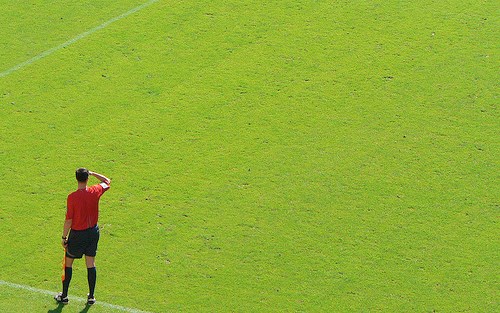It’s stressful and lonely at the top for referees

Stress is taking its toll on elite sports referees, writes Christer Ahl. Photo: CottonIJoe/Flickr.
02.12.2011
By Play the GameIn his blog on Team Handball News, former President of the International Handball Federation’s Playing Rules and Referees Commission, Christer Ahl, reflects on the growing pressure on referees and the tragic consequences that may follow if sports federations do not address their challenges.
According to Ahl, stress levels are rising among elite referees because of the growing scrutiny placed on their performances through more sophisticated television coverage, high stakes associated with top leagues, and time-pressed, often lonely, match schedules.
“The anticipation of an important game … and the sense that one may never feel sufficiently prepared may be factors that create real pressure. Similarly, the self-doubts, the second-guessing after a game, even in the absence of any problems or controversies, may be what prevent a conscientious referee from having peace of mind. If one then adds reactions to criticism, whether justified or not, from media or team representatives, the pressure can really mount,” Ahl writes, pointing out that referees do not have the same support structure around them as the athletes do.
“There is a major handicap that is normally overlooked: elite teams and also top-level individual athletes have an impressive support structure, consisting of a coaching staff, administrators, physicians, physiotherapists, psychologists, nutritionists, etc. Normally, none of that is directly available to the elite referees on an ongoing basis, so they must deal with all their different forms of preparations and their pre- and post-game concerns alone.”
To help avoid incidents like Bundesliga football referee Babak Rafati’s suicide attempt in November, which Rafati later admitted was work stress-related, Ahl wants to see sports federations providing as much support for referees as they do for elite athletes and teams.
“This involves much closer contacts and monitoring, modern support with technical and physical preparations, but also continuous access to expertise on psychological and social aspects. Generally speaking, a network is needed that creates a sense of making the referees part of a team, not just on paper or as a cliché but in a very practical sense. The national federations and clubs are fully capable of taking care of their teams; now it is time to take care of the referee team!”
Read Christer Ahl’s blog entry here.





